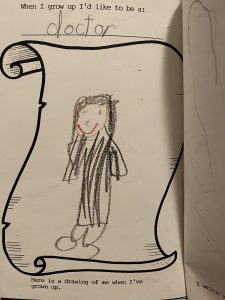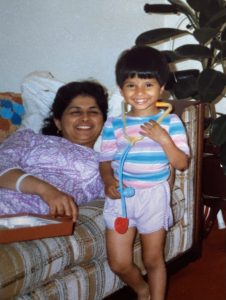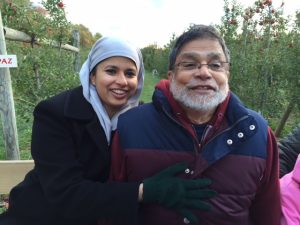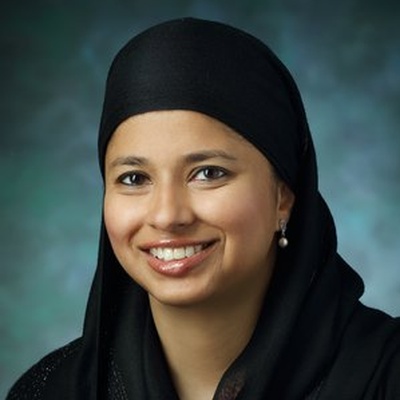Halima Amjad, MD MPH PhD is a most valued core faculty member with the Center. She is an Assistant Professor with the School of Medicine in Division of Geriatric Medicine and Gerontology. Her areas of clinical expertise include geriatric medicine and geriatric psychiatry, with a focus on individuals living with dementia. She is a provider at the Johns Hopkins Memory and Alzheimer’s Treatment Center, located at Bayview. Dr. Amjad is known for being friendly, compassionate, and extraordinarily insightful in her research inquiries and findings. We are grateful for this opportunity to learn more about her personally and professionally, and share with you how truly wonderful Dr. Amjad is through this COAH Champion interview. Let’s start by recognizing a fabulous recent accomplishment! The PhD part of her credentials is new!
Congratulations on earning your PhD degree! This is in addition to your MD and MPH! What does that mean to you? What will you be able to do differently now?
Obtaining a PhD in Clinical Investigation highlights my commitment to a career in clinical aging research and acknowledges that formal training is important to ensuring that clinician researchers have the skills to plan, conduct, and disseminate high-quality research. Several geriatricians at Johns Hopkins followed a similar path to establish themselves as independent investigators, and I hope to do the same. The doctorate degree shows the world, particularly funders and collaborators, that I have a strong foundation in research methodology and a dedication to this career.
Tell us about your background, education, and path to COAH.
 As a pre-schooler, I declared that I wanted to be “mommy and daddy’s doctor” and followed through! I was always drawn to a medical career, a career centered around caring for others. I made the commitment to medicine early, going to a joint BA/MD program for undergrad and medical school (Lehigh University and Drexel University in PA). During my internal medicine residency at Yale, I was drawn to geriatrics because I loved the emphasis on the whole person and family as well as the “less can be more” approach. I think I was subconsciously also led to geriatrics by my dad’s dementia diagnosis. I never envisioned a research career, but I got involved in my first research project related to advance care planning with Terri Fried at Yale. That first experience peeked my interest in research, and I came to Johns Hopkins for a clinical and research fellowship in geriatrics to
As a pre-schooler, I declared that I wanted to be “mommy and daddy’s doctor” and followed through! I was always drawn to a medical career, a career centered around caring for others. I made the commitment to medicine early, going to a joint BA/MD program for undergrad and medical school (Lehigh University and Drexel University in PA). During my internal medicine residency at Yale, I was drawn to geriatrics because I loved the emphasis on the whole person and family as well as the “less can be more” approach. I think I was subconsciously also led to geriatrics by my dad’s dementia diagnosis. I never envisioned a research career, but I got involved in my first research project related to advance care planning with Terri Fried at Yale. That first experience peeked my interest in research, and I came to Johns Hopkins for a clinical and research fellowship in geriatrics to  get more training in aging research and see if I would enjoy research long-term (Hopkins was also closer to my parents, which was important to me). As a fellow, COAH Director Dr. David L. Roth was one of the first mentors I connected with. His mentorship helped me obtain my earliest grants using National Health and Aging Trends Study (NHATS) data to examine potentially unsafe activities among older adults with dementia and then extending that work to examine people living with undiagnosed dementia with NHATS-linked Medicare claims data. Many of my mentors are core or associate faculty of COAH, and I love the interdisciplinary connections and collaborations it brings.
get more training in aging research and see if I would enjoy research long-term (Hopkins was also closer to my parents, which was important to me). As a fellow, COAH Director Dr. David L. Roth was one of the first mentors I connected with. His mentorship helped me obtain my earliest grants using National Health and Aging Trends Study (NHATS) data to examine potentially unsafe activities among older adults with dementia and then extending that work to examine people living with undiagnosed dementia with NHATS-linked Medicare claims data. Many of my mentors are core or associate faculty of COAH, and I love the interdisciplinary connections and collaborations it brings.
Why did you choose to go into this field of work?
 As I carved out a career as a clinician investigator, I focused on dementia care and health services for people living with dementia due to my dad’s diagnosis. He was diagnosed with early-onset frontotemporal dementia just as I was graduating from medical school. Through our family’s experiences, and now also through experiences of my Memory Clinic patients, I have seen the many ways in which medical care and our health care systems fail people with dementia, from diagnosis until death. I know that there are policies, interventions, and clinical practice changes that can improve the care and support that individuals and families receive. My work, and the work of many others, is trying to bring those needed changes. Research can also be daunting when you see the work of senior or established researchers; because of my personal experience, I felt dementia care was one area where I had expertise even as an early career investigator.
As I carved out a career as a clinician investigator, I focused on dementia care and health services for people living with dementia due to my dad’s diagnosis. He was diagnosed with early-onset frontotemporal dementia just as I was graduating from medical school. Through our family’s experiences, and now also through experiences of my Memory Clinic patients, I have seen the many ways in which medical care and our health care systems fail people with dementia, from diagnosis until death. I know that there are policies, interventions, and clinical practice changes that can improve the care and support that individuals and families receive. My work, and the work of many others, is trying to bring those needed changes. Research can also be daunting when you see the work of senior or established researchers; because of my personal experience, I felt dementia care was one area where I had expertise even as an early career investigator.
What paper are you most known for or most proud of?
While my paper on continuity of care and healthcare utilization in older adults with dementia was published in my highest profile journal, I’m most proud of my paper characterizing people living undiagnosed or unaware of dementia in the Journal of General Internal Medicine (which you can find by clicking here). It is work that I envisioned and led. It’s often cited in research to improve diagnosis and disclosure of dementia, which is something that can be a long road for many patients and families, including mine.
Turning to the escapes you may have in your personal world, please share with us your favorite films or songs over the past year.
Two films that I loved happen to also hit home the importance of the work that COAH faculty do: The Father and CODA.
What is the top item on your bucket list?
Foreign travel! Between the pandemic and having triplets, it has been a long time since we’ve been able to explore new places, cultures, and most importantly, food.
Tell us about your hobbies… what renews you?
Time separating myself from work – focused time with my family, vacations (even short ones), exercise (Pamela Reif on YouTube is my go-to), and reading (mostly fiction). Hopefully I can report back with more hobbies and activities once my kids are older!
Favorite daytrip getaway destination?
Fort McHenry is a family favorite for a picnic, playing, and boat watching.
What’s your favorite city or state? Why?
Philadelphia – there’s no place like home.
We thank Dr. Halima Amjad for allowing us into her world through this very personal interview. Absolutely, her commitment to improving the lives of those living with memory loss and dementia comes from a place of sincere compassion, especially as it personally touches her immediate family; we were saddened to learn that her father, Dr. Muhammad Amjad, passed away on March 10, 2022. Diagnosed at age 59 and passing away of end-stage dementia at age 72, he lived 13 years with early-onset frontotemporal dementia at home under the loving care of his wife. Dr. Muhammad Amjad was known for his smile, laugh, generosity, and kindness—all wonderful attributes he clearly passed down to Dr. Halima Amjad. The COAH family expresses our deepest heart-felt condolences on this great loss—may his memory be a blessing.
By Anthony L. Teano, MLA
Communication Specialist

